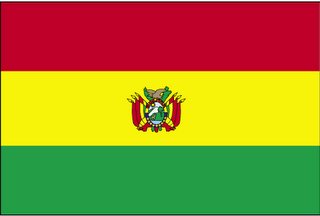(digitalwarriormedia) Following expressions of hope that U.S.-Bolivia relations would improve under the new leadership of President Obama, the situation between the two countries still remain frosty. And if recent statements coming from both sides are any indication of things to come…the road to normalized diplomacy may be a long one.
The U.S. is on the defensive after Bolivia’s President Evo Morales implicated C.I.A. involvement in a corruption scandal that is under investigation at the state oil company Yacimientos Petroliferos Fiscales Bolivianos (YPFB).
On Feb. 20 while speaking in the Chapare region of Cochabamba, President Morales publicly denounced U.S. intervention within YPFB. "There has been a CIA presence in Yacimientos Petroliferos Fiscales Bolivianos," announced Morales, "and some of our colleagues have been caught by this foreign infiltration."
Morales removed the Head of YPFB Santos Ramirez on suspicions of bribery and illegally diverting $86 million from YPFB to a private gas company located in Santa Cruz. The scandal, which is a huge embarrassment to the Morales administration, has resulted in accusations of misconduct against 11 former YPFB executives and Ramirez - a former MAS senator and ally of Morales.
The investigation was unleashed with the robbery and murder of Bolivian businessman Jorge O'Connor in late January. Funds stolen from O'Connor are believed to have been a $450,000 payoff for Ramirez.
Details released last week by Bolivia's Interior Minister Alfredo Rada indicate the involvement of Francisco Martinez - a U.S. embassy employee - and Rodrigo Carrasco, a former manager at YPFB and ex-policeman who had trained in the U.S.
The State Department denied the claims of espionage on Wednesday. "We reject these accusations ... there is no evidence," said Denise Urs, Public Affairs officer for the U.S. embassy in La Paz.
Investigations continue and currently Ramirez faces charges that could earn him up to eight years in prison.
And in other developments between the two nations, a recent report from the U.S. State Department that criticizes Bolivia’s coca growing policy was quickly rejected by the Bolivian government.
Released on Feb. 27, the International Narcotics Control Strategy Report (INCSR) asks Bolivia to reverse its policy on legal coca cultivation. According to Bolivian paper Los Tiempos, the INCSR indicated that the U.S. government was concerned about Colombian and Mexican drug cartels gaining influence in Bolivia and the possibility of an increase in domestic drug related crimes.
The report also asked Bolivia to intensify its cooperation with neighboring countries and make a major effort to combat the illegal drug trade, including allowing the U.S.-led Drug Enforcement Agency (DEA) to return to Bolivia’s territory.
La Paz blasted the report in response.
"The State Department document still has the stubborn myopic anti-narcotic bureaucracy of the administration of George W. Bush," read a communique issued by Foreign Minister David Choquehuanca’s office. According to Minister Choquehuanaca, the report “uses arbitrary figures for the fight against drugs in Bolivia in 2008, based on estimates uncorroborated by any international body."
Meanwhile the annual survey of global counter-narcotics efforts praised Colombia, Afghanistan, and China’s efforts in their fight against drugs. The INCSR is one of the criteria used by Washington for its annual assessment upon which financial and military aid grants are granted.
On Friday, the Bolivian government confirmed that the DEA will not return to Bolivia. The agency and its activities were banned from Bolivia’s territory on Nov. 1, 2008. Within weeks the Bush administration put Bolivia on a blacklist of countries failing to cooperate in efforts against the illegal drug trade.
Bolivia’s preferred trade status was allowed to expire in December 2008 as the Bush White House stated that Bolivia was not doing enough to combat drug trafficking. This occurred despite votes in the U.S. Congress to extend Bolivia’s status under the Andean Trade Promotion and Drug Eradication Act (ATPDEA).
Many viewed the move as retaliation against Bolivia’s expulsion of the DEA, USAID and U.S. Ambassador Philip Goldberg last year.
But since expelling the DEA, Bolivia has made considerable efforts against the illicit domestic drug trade. Morales created a special task force to combat drug trafficking and the police have actively continued to seize cocaine, destroy processing labs and make arrests.
While in Moscow during February, President Morales signed an agreement with his Russian counterpart President Dimitri Medvedev to purchase helicopters from Russia for Bolivia’s ongoing counter-narcotics efforts.
In January, while meeting with Brazil’s President Luiz Inácio "Lula" da Silva, Morales sought and received a commitment from Brazil to provide helicopters and other support to patrol their borders against drug traffickers.
It appears that contrary to statements coming out of the U.S., Bolivia is maintaining Morales' "Zero cocaine" policy and working to meet its domestic goals against corruption and illicit drugs, but on its own terms and without the direct -or indirect - influence of the U.S.
Sources: ABI, Los Tiempos, PressTV, US Dept Of State, The Real News, Reuters & Telesur
|
|
|
 remained at the U.S. Embassy - some for more than a decade. These ongoing assignments were in violation of Bolivian law, which sets a time limit of two years or less.
remained at the U.S. Embassy - some for more than a decade. These ongoing assignments were in violation of Bolivian law, which sets a time limit of two years or less.




